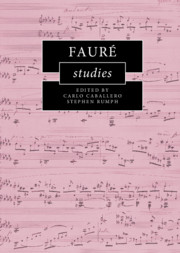Book contents
- Fauré Studies
- Cambridge Composer Studies
- Fauré Studies
- Copyright page
- Dedication
- Contents
- Figures
- Tables
- Music Examples
- Contributors
- Acknowledgments
- Looking Back on a Journey
- 1 Patrons and Society
- 2 Keys to the Ineffable in Fauré
- 3 Fauré as Student and Teacher of Harmony
- 4 Romancing the mélodie, or Generic Play in the Early Hugo Settings
- 5 Lux aeterna
- 6 From Homer’s Banquet to Fauchois’ Feast
- 7 Orchestral Melody in Pénélope
- 8 Fauré the Practical Interpreter
- 9 Fauré, Orientalism, and Le voile du bonheur
- 10 Jankélévitch, Fauré, and the Thirteenth Nocturne
- Index
4 - Romancing the mélodie, or Generic Play in the Early Hugo Settings
Published online by Cambridge University Press: 17 April 2021
- Fauré Studies
- Cambridge Composer Studies
- Fauré Studies
- Copyright page
- Dedication
- Contents
- Figures
- Tables
- Music Examples
- Contributors
- Acknowledgments
- Looking Back on a Journey
- 1 Patrons and Society
- 2 Keys to the Ineffable in Fauré
- 3 Fauré as Student and Teacher of Harmony
- 4 Romancing the mélodie, or Generic Play in the Early Hugo Settings
- 5 Lux aeterna
- 6 From Homer’s Banquet to Fauchois’ Feast
- 7 Orchestral Melody in Pénélope
- 8 Fauré the Practical Interpreter
- 9 Fauré, Orientalism, and Le voile du bonheur
- 10 Jankélévitch, Fauré, and the Thirteenth Nocturne
- Index
Summary
Gabriel Fauré’s long career as a song composer, which stretched from 1861 to 1921, divides conveniently in half. Until 1890, he wrote individual mélodies; thereafter, he composed all but a handful within six carefully integrated cycles. (The lone outlier is Poème d’un jour, a short cycle composed in 1878.) Fauré’s turn to cyclic composition comes as little surprise as he had always tended to concentrate on individual poets. He confined himself to Victor Hugo in his early years, and then moved systematically through Charles Baudelaire and Théophile Gautier before immersing himself in the poets of the Parnassian school. With singleminded focus, he would set ten poems by Armand Silvestre (1878–84), seventeen by Paul Verlaine (1887–94), and eighteen by Charles van Lerberghe (1906–14).
Keywords
- Type
- Chapter
- Information
- Fauré Studies , pp. 80 - 112Publisher: Cambridge University PressPrint publication year: 2021

